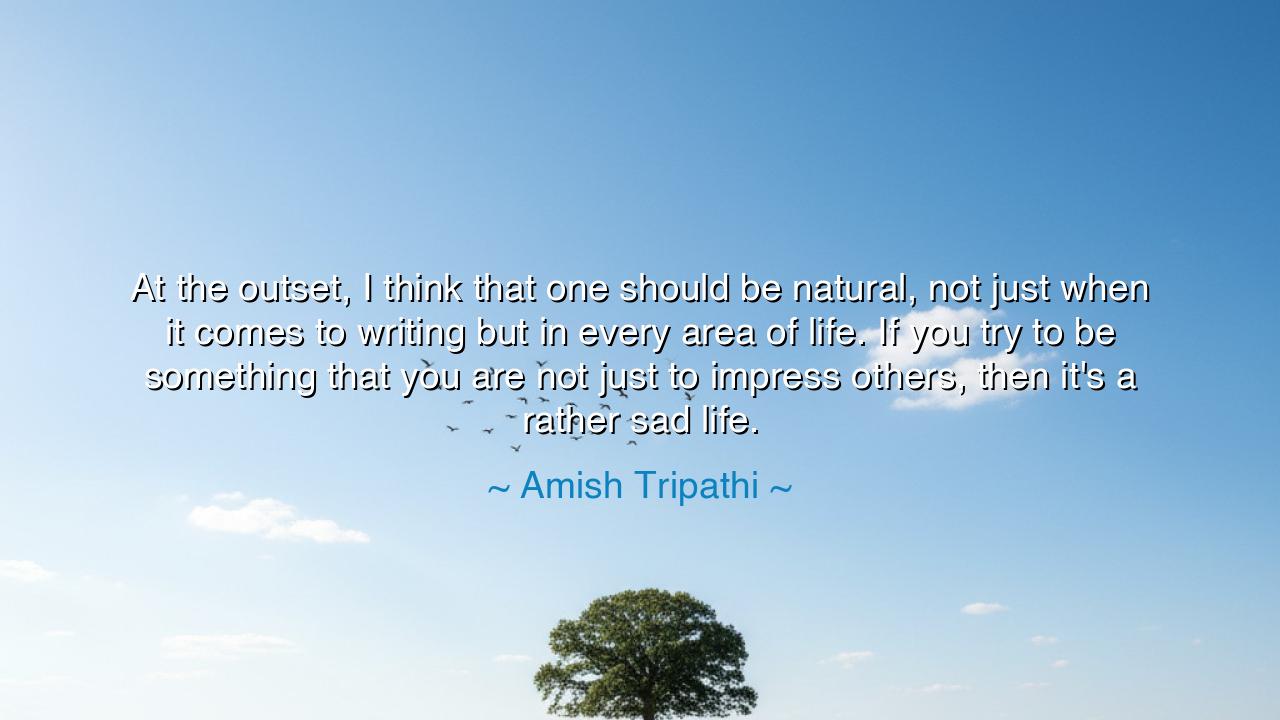
At the outset, I think that one should be natural, not just when
At the outset, I think that one should be natural, not just when it comes to writing but in every area of life. If you try to be something that you are not just to impress others, then it's a rather sad life.






Hear now the words of Amish Tripathi, who speaks with the clarity of a sage: “At the outset, I think that one should be natural, not just when it comes to writing but in every area of life. If you try to be something that you are not just to impress others, then it's a rather sad life.” In this saying shines a truth as old as the mountains: that a man or woman who adorns themselves in masks may gather applause for a moment, but their heart will remain hollow. To be natural is to be whole, to live in accordance with the rhythm of one’s true self, and to let the inner flame shine without the dimming shadow of pretense.
The world is quick to reward those who perform, those who bend their shape to please the eyes of the crowd. Yet this reward is fleeting, for it is built upon illusion. Tripathi reminds us that to live in such a way is a “sad life”—not because the world fails to honor you, but because you fail to honor yourself. When a soul betrays its own nature, it withers, no matter how richly others may praise it. Thus the call is not merely to authenticity in writing, but to authenticity in life itself.
Think of Diogenes of Sinope, the philosopher who lived in a barrel, scorning the trappings of wealth and false appearances. When Alexander the Great, master of the known world, approached him and asked what he desired, Diogenes answered only: “Stand out of my sunlight.” In that moment, a man who had nothing showed himself greater than the man who possessed everything. Why? Because he was utterly natural, true to his own way, unshaken by the hunger to impress. His life, though simple, was not sad. It was luminous.
So too, Tripathi warns us that to shape ourselves into what we are not, merely to be admired, is to forfeit the only treasure worth keeping: the freedom to be who we are. The applause of others fades like mist at dawn, but the joy of living authentically endures like the sun. To write in your own voice, to speak your own truth, to walk your own path—these are acts of courage far greater than conquest, for they demand a war against the fear of rejection.
Let us then not mistake performance for fulfillment. Many have lived lives of grandeur only to confess emptiness at the end. Consider the tale of Oscar Wilde, who once adorned himself in wit and brilliance to dazzle society, yet later declared, “Most people are other people. Their thoughts are someone else’s opinions, their lives a mimicry, their passions a quotation.” He himself knew the cost of such mimicry, and it was heavy. Thus the warning of Tripathi is echoed by voices across the ages: the cost of falsehood is the sorrow of never having truly lived.
What lesson then shall we draw? It is this: live as you are, not as others demand you to be. Be natural, whether in the art of writing, the speech of daily life, or the choices of the heart. Do not waste your breath in performance for a fickle audience; let your soul sing in its own tongue, for only then will you know joy. And if the world does not applaud, so be it—the earth itself, the sky, and your own heart will bear witness to the beauty of your truth.
Practical is this counsel. Begin with small acts of honesty: write words that reflect your heart, not what you think will win approval. Speak to friends without masks, daring to show both strength and weakness. Choose paths not because they are admired, but because they are yours. And when fear whispers that you must impress others to be valued, remember Tripathi’s warning: such a life is sad, for it is not truly yours. Better to live as yourself and be overlooked, than to live as another and never be found.
Thus the teaching stands: to be natural is to be free, and to be free is to be alive. Carry this wisdom as armor against the world’s temptations, and let your life be not a performance for others, but a hymn of truth sung with your own voice. For the greatest honor is not to dazzle, but to live without shame in the radiance of your own being.






AAdministratorAdministrator
Welcome, honored guests. Please leave a comment, we will respond soon